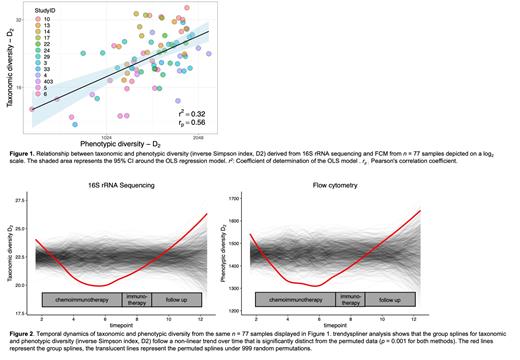Abstract
Introduction
Microbial dysbiosis is associated with increased infectious complications and poorer treatment outcomes in patients with hematologic malignancies (Galloway-Pena et al., 2016, Peled et al., 2020). While the effective reconstitution of microbial diversity by autologous fecal microbiota transfer appears within clinical reach (Malard et al, 2021), diagnosis of dysbiosis typically relies on comparatively slow and laborious molecular techniques. We validated a fast and reliable method to assess and track microbial diversity based on flow cytometric analysis (FCM) of single cell phenotypical traits in stool samples of patients undergoing therapy for aggressive lymphoma disease.
Methods
Stool samples of 12 patients with B-cell neoplasms and 1 patient with a T-cell neoplasm were collected at the time of diagnosis, directly before each cycle of chemoimmunotherapy administration (CHOP backbone +/- anti-CD20 therapy) and every 3 months during follow-up (2-11 samples per patient totaling n = 77 samples). Microbiome analyses were performed by sequencing the V3/V4 16S rRNA region and by FCM of light scatter properties and DNA content (DAPI staining). Phenotypic and taxonomic alpha diversity (inverse Simpson index, D2) was determined from the flow cytometric profiles and sequencing data, respectively, using the PhenoFlow R package (Props et al., 2016). Longitudinal trends in alpha diversity were evaluated with the SplinectomeR R package (Shields-Cutler et al., 2018).
Results
Correlation analysis and ordinary least squares regression confirmed a statistically significant association between FCM-based phenotypic and sequencing-based taxonomic alpha diversity in "real-world" patient fecal samples (Pearson's correlation r p = 0.56, r 2 = 0.32, p < 0.001) (Figure 1). Despite the distinct and complex data types generated by the two methods, these results demonstrate that phenotypic diversity measurements obtained from FCM can serve as proxies for taxonomic diversity measurements obtained from 16S rRNA sequencing.
Next, we analyzed the dynamics of microbial alpha diversity in our cohort over the course of therapy and follow-up using a spline-based approach optimized for longitudinal data. We demonstrated a statistically significant non-linear trend of alpha diversity with a decrease during the period of chemotherapy administration followed by reconstitution during the immunotherapy and follow-up period (Figure 2) using both FCM and 16S rRNA sequencing (p = 0.001). Notably, the samples collected during the treatment phase were obtained 2-3 weeks after the last administration of chemoimmunotherapy, depicting a progressive and sustained dysbiosis in patients during the months of chemotherapy.
Conclusions
We demonstrated a clear correlation between microbial alpha diversity as determined by 16S rRNA sequencing and by our flow cytometric-based approach. Using FCM analysis, we found a marked decline in diversity during chemotherapy administration. These results are in line with the dysbiosis pattern observed by 16S rRNA sequencing and with previous studies (Rashidi et al., 2019). Our findings thus demonstrate that FCM could provide a fast, first-line point-of-care monitoring of microbial diversity dynamics.
Jenq: Merck: Consultancy; Karius: Consultancy; Microbiome DX: Consultancy; Seres: Membership on an entity's Board of Directors or advisory committees, Patents & Royalties; Kaleido: Membership on an entity's Board of Directors or advisory committees; MaaT Pharma: Membership on an entity's Board of Directors or advisory committees; Prolacta: Membership on an entity's Board of Directors or advisory committees; LISCure: Membership on an entity's Board of Directors or advisory committees. Bullinger: Daiichi Sankyo: Consultancy, Honoraria; Abbvie: Consultancy, Honoraria; Sanofi: Honoraria; Amgen: Honoraria; Gilead: Consultancy; Jazz Pharmaceuticals: Consultancy, Honoraria, Research Funding; Hexal: Consultancy; Novartis: Consultancy, Honoraria; Bayer: Research Funding; Pfizer: Consultancy, Honoraria; Seattle Genetics: Honoraria; Bristol-Myers Squibb: Consultancy, Honoraria; Menarini: Consultancy; Janssen: Consultancy, Honoraria; Celgene: Consultancy, Honoraria; Astellas: Honoraria. Na: Octapharma: Honoraria, Research Funding; Shire/Takeda: Honoraria, Research Funding; Bristol Myers Squibb: Research Funding.


This feature is available to Subscribers Only
Sign In or Create an Account Close Modal